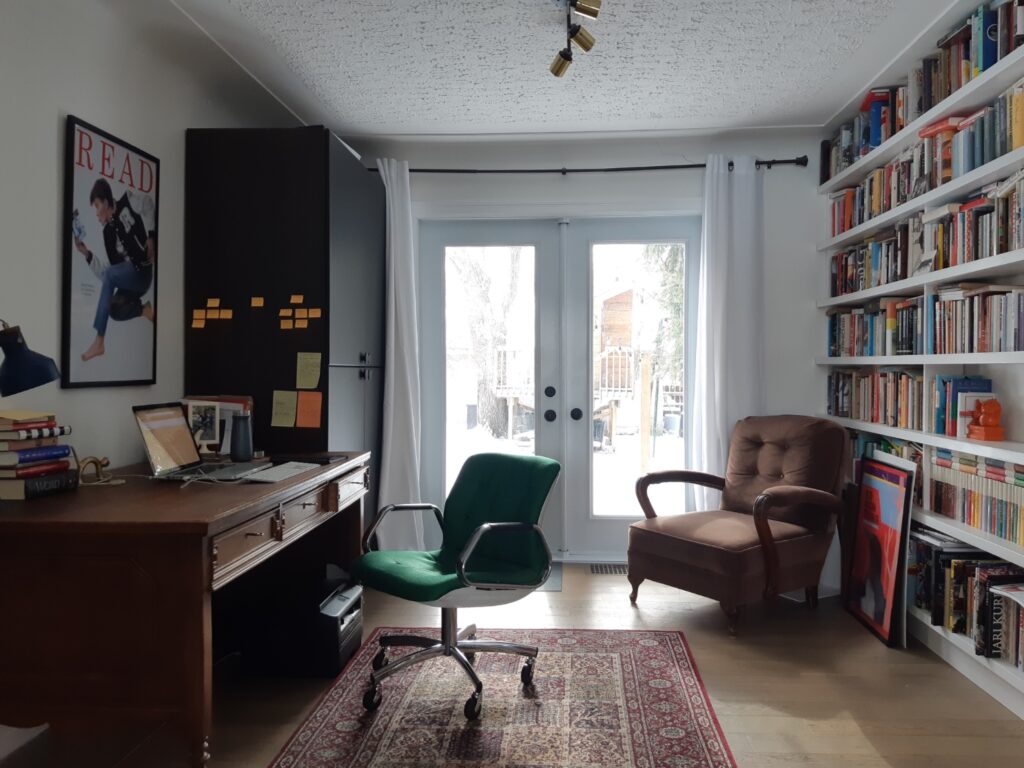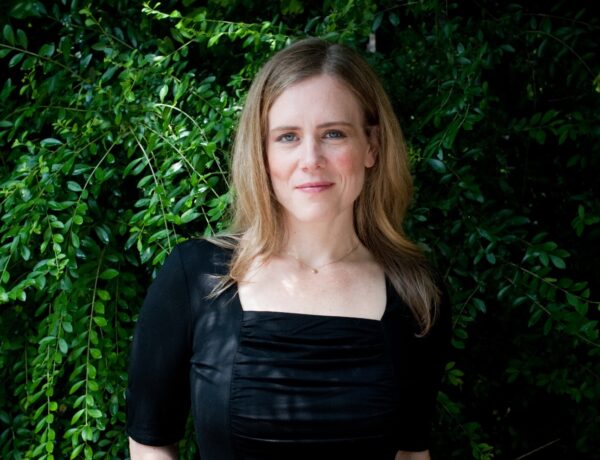Michael Hingston is an author and publisher in Edmonton, Alberta, Canada. He has written several books, including Try Not to Be Strange: The Curious History of the Kingdom of Redonda, which was published by Biblioasis in 2022.
He also co-wrote the memoir One Game at a Time and is the creator of Edmontonia Trading Cards. Michael’s work has been featured in publications such as National Geographic, Wired, and The Washington Post. He is a co-founder of Hingston & Olsen Publishing, which produces the Short Story Advent Calendar, and he buys and sells books on Instagram under Porch Light Books.
Each week, we publish a new daily writing routine from a famous author. Subscribe to our newsletter so you don’t miss out!
Hi Michael, welcome to Famous Writing Routines, great to have you here with us today! Your new book, Try Not to Be Strange: The Curious History of the Kingdom of Redonda, is a fascinating exploration of a little-known piece of history. What first drew you to the story of Redonda, and how did you go about researching and writing the book?
Thank you, happy to be here. I first heard about Redonda while reading a novel by Javier Marias called All Souls, and my ears perked up immediately: an island kingdom ruled over by writers? It seemed like such an odd, obviously fake detail to throw into what seemed to be an otherwise realistic and maybe even autobiographical novel. I figured it would be a matter of minutes to figure out whether this story was true or not, but nearly a decade later, I’m still not sure whether I got to the bottom of it.
The cast of characters in the history of Redonda is truly remarkable, from forgotten sci-fi writers to alcoholic poets to Nobel Prize frontrunners. How did you go about uncovering these figures and their stories, and what surprised you the most in your research?
The book is a series of surprises, really, both for its readers and its writer. Most of the people involved are minor figures, and I’d hardly heard of any of them when I first got going. There was even a brief moment, early on, where I started to suspect the whole thing was a hoax, and that not only did the kingdom not exist, but also none of the kings did, either. It was a true paper trail involving out-of-print books, obscure magazine and newspaper clippings, word of mouth, and some tense hours spent in archives and at online auctions.
It’s hard to pick one surprise above the rest, given how many unbelievable detours the story takes, more than one involving literal blood pacts. But I had to laugh when I first came across the story of the pub in England that tried to declare itself an official Redondan consulate—just to get around recently passed anti-smoking laws. A very silly, very funny, very Redondan tale.
The book has been described as part literary history, part travelogue, and part quest narrative. How did you balance these different elements in your writing, and what do you hope readers take away from the book?
Ideally, I want readers to come away feeling like they’ve never read a story quite like this one. That’s certainly how I experienced it: for years I described the Kingdom of Redonda as my favorite Wikipedia article, and the book-length version of the story is somehow even wilder. At the same time, I knew it had to blend different approaches, given the mixture of humor and gravitas that informs the Redondan legend. A ramshackle approach for a ramshackle subject, if you will. It’s not for me to say whether I pulled it off, but I really did throw everything I had at this story.
In addition to being a fascinating piece of history, the story of Redonda also touches on broader themes like the power of storytelling and the allure of fantasy. What do you hope readers take away from the book on a deeper level?
Well, I don’t know that there are any deeper lessons, really. Or at least none that I tried to stuff in too forcefully. That being said, the book certainly contains an argument for the benefits of play, and humor, and letting one’s guard down, especially when the dreariness of adulthood threatens to engulf us all. And more than one reader has told me that Redonda makes a pretty convincing argument that all nations are, to some extent, figments of their subjects’ imaginations.
Do you struggle to stay focused while writing? You’re not alone! That’s why Famous Writing Routines recommends Freedom – the ultimate app and website blocker for Mac, Windows, Android, iOS, and Chrome. With over 2.5 million users, Freedom helps writers stay on task and avoid distractions. Get started for free today and reclaim your productivity!
You’ve been praised by critics for your engaging and entertaining writing style. How do you balance telling a good story with providing in-depth research and analysis?
That’s the magic of revision! I can assure you that the first draft of this book was a lot longer, and a lot duller. That was probably natural: I had so much material on hand and at times I’d lost sight of what was interesting to the layreader. So I threw it all on the page and only afterwards took a step back to see what it looked like. Pace is always key.
Once I had the bloated first draft complete, it was a matter of paring down, cutting away, sometimes a single word or phrase at a time: if it didn’t relate to the Kingdom of Redonda, it had to go. And then there’s a structural layer, making sure the transitions and cuts all come at natural moments. You’re trying to anticipate when the reader is ready to move on, and when they want to linger. If you do it right, your readers won’t want to put the book down. If you do it wrong, they won’t want to pick it back up.
You’ve written nonfiction, a novel, and even co-written a memoir. How do you approach writing in different genres, and do you have a preference for one type of writing over another?
At this point in my career, I think I can safely say that I find fiction incredibly difficult. My first book was a novel, but ten years later, I’ve barely even tried my hand at it since. It’s just not how I naturally think. Too much freedom, maybe. Whereas non-fiction, whether you’re writing in your own voice or trying to capture someone else’s, is a slave to the facts, to the chronology, to stuff that really happened. There’s artistry involved in how you tell the story, of course, but those built-in parameters can end up being liberating in their own way.
In addition to writing, you’re also a publisher and co-founder of Hingston & Olsen Publishing. What do you enjoy about the publishing process, and how does it inform your work as a writer?
Publishing is a blast—or at least, the way we do it at H&O is. Most of what we produce is deluxe box sets, and my favorite part of the process is the sequencing: thinking how each story talks to the ones on either side of it, what makes a good starting entry, how to go out on a high note, all that good stuff.
It’s also very gratifying to be able to give a great piece of writing the permanent ink-and-paper home it deserves. We’ve worked with some amazing talents over the years, from Carmen Maria Machado to George Saunders to Patton Oswalt. It still boggles my mind that they all said yes to us. I can only hope we’ve done justice to their excellent work.
Really, everything I do—writing in different genres, dabbling in publishing, even bookselling—is a means of keeping myself amused and energized. Each type of work recharges the battery of the others.
Can you tell us about your writing routine? What does a typical day look like for you?
I’m lucky enough to be able to do this more or less full-time, so I spend around six hours at my desk each day (with room left over to pick up my son from school and run a million dumb little errands). But to be honest, my routine kind of stinks. It really depends on what I have to do on a given day, and for quite some time I’ve felt that I haven’t been making great use of my time.
So just a few weeks ago I tried to impose a new schedule: mornings for pure head-down writing with no distractions, then a late breakfast, then afternoons for administrative tasks like emails and paperwork. Too early to say if it’s really working, though at least I tweet less than I used to.
If you could have a conversation with any author throughout history about their writing routine and creative process, who would that person be?
I don’t think I’d go back too far, to be honest, since most of my interest in other people’s processes is motivated by selfish self-interest, and I’m not sure there’s much to learn from writers who didn’t have to ignore the internet. Or maybe it’s not about picking up tips so much as justifying the way I already do things: what a relief it was to learn that Marias, Redonda’s wily King Xavier, only wrote for an hour or two each day.
I’d love to know about the books you’re reading at the moment. What have been some of your favorite recent reads?
Penelope Fitzgerald’s The Bookshop was my first true love of 2023—a concise, tricky, excellently written novel that I read in 24 hours flat. I also enjoyed Ahab’s Rolling Sea by Richard J. King, a natural history of Moby-Dick that digs into just how much Melville/Ishmael actually knew about the sea circa 1850 (it turns out: more than you might think). And when I recently found myself in a bit of a slump, I went back to Chris Bachelder’s U.S.!, which is one of my favorite novels of all time, full stop.
What does your current writing workspace look like?
My office is in a corner of the main floor of my house in Edmonton, Alberta, Canada. It’s south-facing, so I get lots of light through the patio doors in the mornings. I just got a nice big oak desk from a local antique mall that’s big enough for the various piles of paper I need around me at all times; behind me is an entire wall of books. It’s a lovely set up. Nothing to complain about, really. Although I could use a second wall of books, now that I think about it.

Affiliate disclaimer: Some links on this website are affiliate links. We may earn a small commission if you make a purchase through these links, but only promote products we truly believe in. We disclose affiliate links and give honest reviews.



No Comments